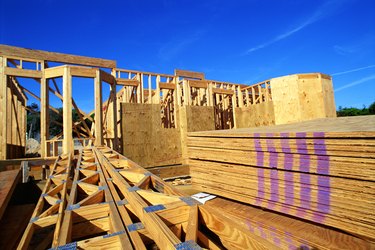
The frame is more important for the longevity of your house than the paint color in the dining room. You home weighs thousands of pounds, and without proper support, the floors can sag and the walls crack. The frame under the floors of your home consists of joists. Among them are header and stringer joists, which are critical.
Stringer Joists
Video of the Day
The frame for a subfloor is similar to a large wooden square. The joists at the edges are the header and stringer joists. They run parallel to one of the house's exterior walls. The stinger joists are nailed on end into the header joist, with the header covering the butt of the joists. Floor stringers run parallel to the direction of the lap joists in the flooring.
Video of the Day
Support
Along with the header, the stringers are the only joists nailed into the sill plate, which is anchored to the house's foundation. The other joists in the flooring are not connected directly to the foundation. Their ends are nailed into the header joist. A girder running perpendicular to the lap joists holds up the middle of those joists, but they are not directly attached to the foundation or the sill plate.
Stability
The header and stringer joists are collectively called the band joists because they create a band around the edges of the subfloor to hold it together and add stability to the structure of the subfloor. The stringers also support the exterior walls built on top and add stability to them by transferring their load directly to the foundation through the sill plate.
Stair Stringers vs. Floor Stringers
Stringers used in flooring are not the same as stringers used in stairs. Although they share a name and both offer support to a structure, stair stringers have a distinctive difference. They are perpendicular to the stairs. The header piece at the top of the stairs is parallel to the stairs. Usually, stairs are nailed directly into the stringers, which provide support and keep the line of the stairs even.